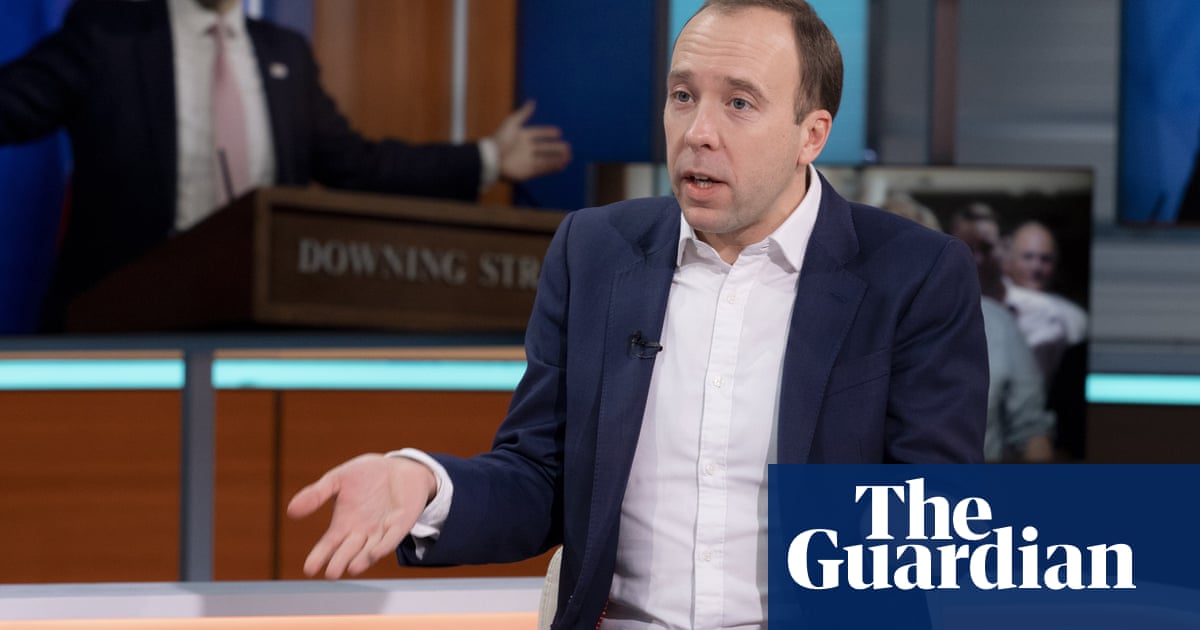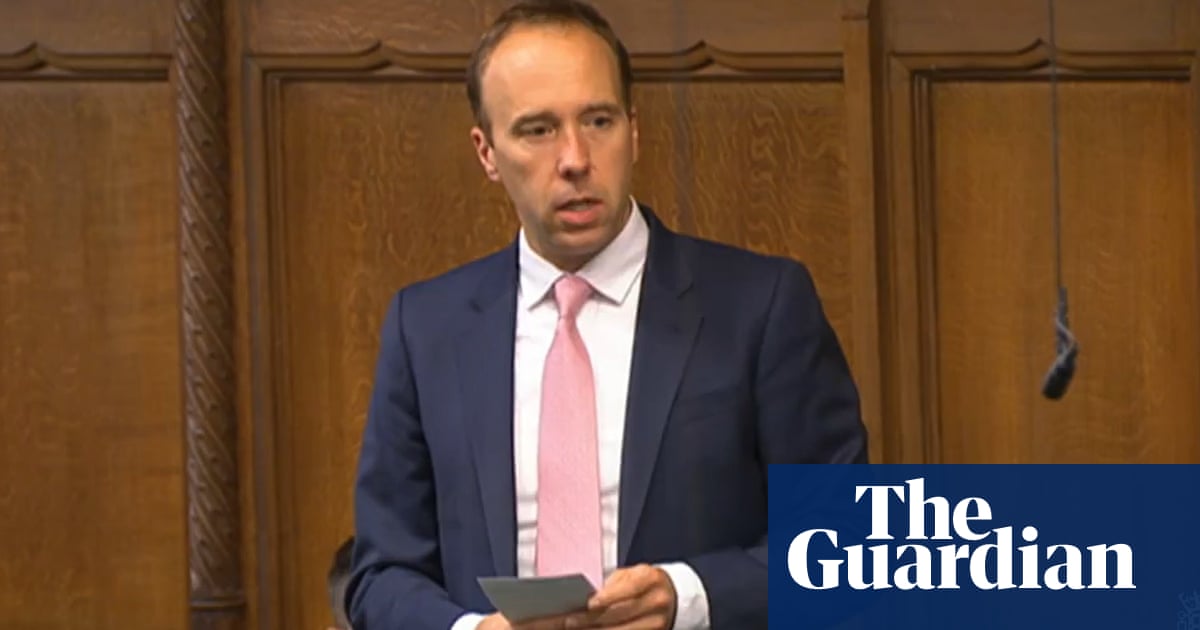
Matt Hancock sounded tetchy and exhausted on Friday morning as he took to the airwaves once again to explain the latest swerve in the government’s strategy for tackling coronavirus: recruiting an army of contact-tracers in an attempt to track its spread.
Asked whether his self-imposed target of testing 100,000 people a day by the end of next week would be met, he let out a self-deprecating laugh. The health secretary knows there’s a lot in the balance: the health of millions, his standing among the public and colleagues, perhaps even his career.
Hancock honed his politics as George Osborne’s chief of staff, at the centre of the Conservative-Liberal Democrat coalition government, with a desk in the office that linked Osborne’s rooms and David Cameron’s, and a seat at the table for key meetings.
His Labour shadow, Jon Ashworth, who once worked for Gordon Brown, recognised Osborne’s talent for framing the political debate in that 100,000-a-day target, which helped to halt a growing sense of government drift.
But he describes it as “a big figure, plucked out of the air” and he complains that contract tracing, which both Labour and Hancock’s predecessor Jeremy Hunt have been calling for for weeks, is only just being implemented. “Why are we only doing this now?” he says.
Even at the time it was made, the 100,000-a-day promise was regarded by some colleagues as rash. But as the deadline approaches, Hancock’s team insist there is a fighting chance that it can still be met – with capacity dramatically increased, and all key workers now allowed to apply.
And No 10 is, for now, throwing a protective arm around the careworn health secretary. One Downing Street source described Hancock’s work as “incredible” in an “unprecedented situation”, saying: “I would point you to our original plan to lower the curve and increase NHS capacity, this was our original aim and it’s been handled very well.”
A cabinet source acknowledged that Hancock can seem “irritating” to fellow ministers, rubbing them up the wrong way in part because of his insistence on keeping lockdown measures in place to guard against a second peak. But they insist he is not becoming the fall guy in a growing blame game.
“He might be rather irritating some of his colleagues but I don’t detect an operation against him in No 10,” the source said. “People are knackered and some very difficult conversations are going on about how things could and couldn’t have been done. But that doesn’t mean he’s being lined up to go.”
Hancock, 41, is known at Westminster for his Tiggerish ebullience, and the iron-clad self-confidence that propelled him into the Tory leadership race last year (slogan: Let’s Move Forward).
After he shuttered his campaign and quickly fell in behind the frontrunner, Johnson, he was rewarded with the privilege of remaining in his job – and now finds himself at the centre of the biggest public health crisis for a generation.
Perhaps surprisingly there is sympathy, not brickbats, for Hancock among NHS bosses, who lay most of the blame for the shambles over testing elsewhere.
The chief executive of one NHS hospital trust told the Guardian: “I think he’s doing a good job and most of the public think he’s been open and transparent. When he first became health secretary he seemed too young for such a big job. But, just like Jeremy Hunt before him, he’s really learning his brief.
“He’s energetic, he’s very passionate about the health and care system and really pro the NHS. And if he stays in his job he will be regarded very well [by NHS bosses], because he listens and does champion the NHS. It’s hard to be negative about him.”
The CEO, however, fingered the department that Hancock leads – and the confusing array of NHS bodies that are a legacy of his predecessor Andrew Lansley, who reorganised the health service in 2012-13 – reserving particular ire for Public Health England (PHE).
“The problem is that all of these arm’s-length bodies are separate to the rest of the NHS,” the CEO said. “PHE is a body made up of scientists yet it became responsible for the whole operational response to coronavirus, and left to operationalise its pandemic theory in the NHS, even though NHS England, not them, are the operational delivery arm of the NHS. Why did that happen?
“Also, why did the Department of Health decide to commission these testing centres themselves? Why didn’t they just leave it to the NHS, who would have found a few hospital chief executives who know what they’re doing and they would have done it probably pretty well?”
The chair of the board at another trust, a senior figure in the NHS for many years, said on Friday : “If you had asked me 48 hours ago I would have said that Matt Hancock was dead in the water over testing. But bringing in the army, increasing the number of testing centres and, especially, finally making it clear who is eligible for a test, means he will probably survive, because the capacity – if not the number of tests carried out – will probably go up to 100k.
“Jeremy Hunt is right that we should have had mass testing from the start, like in Germany, so everyone who wanted a test could have had one. But I don’t blame the politicians on this. What advice were they being given on this by their so-called advisers and by PHE?
“I feel sorry for the secretary of state in a way. He can only make decisions based on the evidence that he was given. Was he advised to ramp up testing and decided not to do so? If so, that’s one thing. But did PHE say that it wasn’t worth doing that or that there wasn’t the capacity to do so?”
Ashworth agrees that it is difficult to disentangle which of the government’s failings lie with Hancock, and which with No 10 or the government’s scientific advisers.
But he wonders whether the health secretary has challenged the scientific advice robustly enough. “Scientists are making judgments, based on data, and they’re making judgments about human behaviour,” he says. Asked whether a non-medic – the health secretary is an economist – would have the capacity to do so, he adds: “Hancock is immensely self-confident.”
Perhaps the biggest judgment about how to weigh the scientific advice is still to come, however, as ministers debate which of the stringent lockdown measures to lift, and when.
Hancock is described by colleagues as particularly exercised about the risks of a second peak of the virus – something Dominic Raab, deputising as prime minister, has also stressed.
His allies reject the idea that Hancock has clashed with the chancellor over how soon constraints should be lifted. “You couldn’t get a fag-paper between them,” one ally insists, adding that he understands very well the risks to the economy and society of an extended lockdown. “It’s not as if Matt goes into the room thinking about everything through the prism of health.”
They express frustration, too, that the government’s successes – including the dramatic expansion in NHS capacity as the huge organisation was repurposed to tackle the outbreak – are skipped over.
But Peter Kyle, a Labour MP who has been critical of Hancock’s promises on testing and personal protective equipment in care homes, complains that his approach hasn’t served the public well.
“He does not seem to be learning from his mistakes. Just as we saw with Theresa May’s government on Brexit, he overcomes one undeliverable promise by making a bigger one and it becomes a house of cards,” he said.
“The inevitable public inquiry will have to look at how these promises came to be made. The system has infected care home residents and led to widespread loss of lives. There was nobody banging on the cabinet table about it for a long time. It was all about the macho posturing of who can make the biggest promise and say the biggest number and who can put up the most bravado for the cameras.”
Potted profile
Born 2 October 1978 in Cheshire
Career Educated at the independent King’s School in Cheshire before studying politics, philosophy and economics at Exeter College, Oxford, then an MPhil in economics at Christ’s College, Cambridge.
He worked at the Bank of England before being hired as an advisor to George Osborne, rising to the position of chief of staff to the then-chancellor. He was elected as MP for West Suffolk in 2010, enjoying stints as a minister in several departments before becoming culture secretary in January 2018 then health secretary six months later.
High point Appointment as health secretary in July 2018 – one of the most important departments in government.
Low point Retweeting a poem that described Labour as a party “quite full of queers”. He later apologised and said it was a “total accident”.
He says
I was deeply affected by the recession of the early 90s, when my family business was days away from going under and it was not only my parents’ jobs that were on the line but the 30 or so people who they employed, and every day we waited for the key cheque to come in, and our house was on the line, and eventually it did – and that was seared across my soul.
They say
I have never seen such an empty vessel as a cabinet minister












